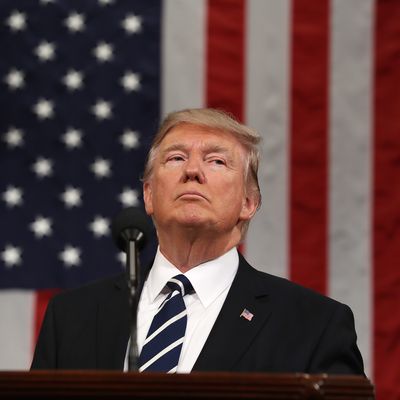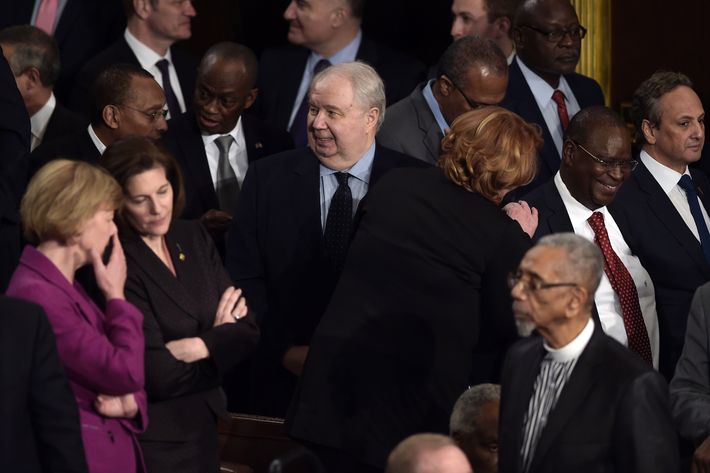
The high point of Donald Trump’s presidency to date — the moment when those who desperately wanted to close their eyes and imagine a normal president standing before the country got something resembling their wish — came during his late-February speech to a joint session of Congress. Trump managed to read his address without narcissistic digressions, and the message he delivered (“Nationalism with an indoor voice,” as one White House official put it) would have been obvious to any casual listener. Over and over, Trump blamed America’s problems on foreigners or the willingness of past leaders to accommodate them: “We’ve watched our middle class shrink as we’ve exported our jobs and wealth to foreign countries”; “We’ve defended the borders of other nations while leaving our own borders wide open for anyone to cross”; “America must put its own citizens first”; “Our obligation is to serve, protect, and defend the citizens of the United States”; “My job is to represent the United States of America.”
The display of overt, bellicose nationalism presents a morbid contrast with the unfolding Russia scandal, which exposes the president’s boasts of domestic loyalty as containing all the irony of the title of the television show The Americans. The scandal is spinning off in multiple directions, but at bottom it suggests a betrayal of American sovereignty by Trump that is unprecedented in the history of the republic. For a still-unclear combination of reasons — greed for power, greed for money, vulnerability to blackmail, or motivations unknown — the incoming administration cooperated with the undermining of American democracy by a hostile foreign power.
Here’s what Donald Trump has actually said about Putin in public:
This is already known. On July 4, Franklin Foer wrote in Slate the first major story in the American media identifying a Russian plan to influence the presidential election. He pieced together such evidence as Trump’s extensive financial ties to Russia; Vladimir Putin’s pattern of intervening in elections in the West in order to support his preferred candidates; Russia’s hacking of Democrats’ emails; and the fact that a number of Trump advisers had been paid by sources loyal to the Kremlin, including Trump’s then-campaign manager Paul Manafort, who had carried out a similar strategy on behalf of a pro-Russian candidate in Ukraine that he seemed to be doing in the United States.
In the months that have followed, more reporting on this strange and sinister axis has emerged, mostly in the form of reports that have burst onto the scene as bombshells, only to be quickly displaced by other stories in the disorienting, surreal news environment that is Trump’s Washington. The New York Times has found that “phone records and intercepted calls” reveal that Trump associates had “repeated contacts with senior Russian intelligence officials” and that U.S. allies had uncovered meetings in European cities between Russian officials and Trump associates.
It is not illegal to meet with Russian agents or spies. However, Trump and his advisers have repeatedly lied or contradicted themselves about these meetings. Former national-security adviser Michael Flynn lied to the FBI about his discussions with Russia following the election. Attorney General Jeff Sessions, who told a Senate committee during his confirmation hearings “I did not have communications with the Russians,” in fact met twice during the campaign with Russian ambassador Sergey Kislyak. Only after the Washington Post reported on the meetings did Sessions agree to recuse himself from his own department’s investigation into the matter.
Trump’s statements on his relations with Russia have oscillated wildly. Asked in 2013 if he had a relationship with Putin, Trump said, “I do have a relationship, and I can tell you he’s very interested in what we’re doing here today.” In 2014, he recounted, “Putin even sent me a present, beautiful present with a beautiful note, I spoke to all of his people,” and that he “spoke indirectly and directly” with Putin. In 2015, he boasted, “I got to know [Putin] very well.” Last year, he insisted, “I have no relationship with Putin” and that “I don’t know Putin … I never met Putin.”

One well-known explanation for this relationship was supplied by a dossier compiled by Christopher Steele, a British intelligence officer turned private investigator. Steele’s report alleged a deep web of financial and personal ties between Trump and Russia, including, spectacularly, a videotape of the now-president engaging in sexual fetishes with prostitutes in Moscow that was being used to blackmail him. The accusations in the dossier remain largely unverified. But since it was made public in January, its credibility has grown. Last month, CNN reported that American investigators corroborated some of the claims in the dossier, and the Washington Post reported that the FBI believed Steele credible enough to considered hiring him to continue his investigation.
While Trump has kept hidden his own financial ties to Russia, enough public evidence has emerged to suggest they are extensive. After his company’s bankruptcies made him untouchable by American banks, Trump grew increasingly dependent on foreign sources of capital. “Russians make up a pretty disproportionate cross-section of a lot of our assets,” Donald Trump Jr. told a real-estate conference in 2008. “We see a lot of money pouring in from Russia.” Trump hired a Russian gangster named Felix Sater, who even worked out of Trump Tower and used Trump Organization business cards.
Trump has tweeted, “For the record, I have ZERO investments in Russia,” a defense that evades the question of whether Russia has any investments in his properties. Asked last summer if Trump had “no financial relationships with any Russian oligarchs,” Manafort delivered a comically unconvincing denial, averting his eyes from the camera, shrugging his shoulders, and stammering, “That’s what he said — I’d — that’s what I said — obviously, that’s what our position is.”
The most obvious untapped source of information on Trump’s contacts with Russia would be his tax returns, which Congress could require him to release. But Congress has refused to do so. Instead, with the exception of a handful of critics, the Republican Party has sheltered its president in a protective envelope. At the behest of the White House, the chairmen of the House and Senate intelligence committees contacted reporters to dispute news of Trump contacts with Russian officials. “They’ve looked, and it’s all a dead trail that leads me to believe no contact, not even pizza-delivery-guy contact,” said House chairman Devin Nunes.
On March 2, House Speaker Paul Ryan asserted that he had seen “no evidence that anybody on the Trump campaign or an American was involved in colluding with the Russians.” What evidence would he like? A Trump adviser coyly revealing his advance knowledge of stolen email dumps, then admitting he has a “back-channel communication with Assange”? Because that exists. Maybe video of Trump asking Putin to hack his opponents’ email? Because that exists, too. “Russia, if you’re listening, I hope you’re able to find the 30,000 emails that are missing,” Trump announced at a press conference last summer. “I think you will probably be rewarded mightily by our press.” (Trump later claimed he was joking.) Even if Trump had nothing to do with encouraging the Russian hacking, aggressively exploiting it was a conscious choice. Other Republicans, like Marco Rubio — in one of his periodic outbreaks of conscience — asserted that the GOP should renounce the use of information from WikiLeaks rather than reward foreign interference in American elections. Trump made the opposite decision.
And Trump’s party has mostly decided likewise. All of it is fine — the nondisclosure of tax returns, the unprecedented self-enrichment, the fantastic lies and authoritarian lingo. Republicans in Washington see Trump as a useful vehicle for their policy objectives. Indeed, at least for the time being, Trump’s nationalist ravings have utility for special interests from the Kremlin to Wall Street, all of whom look upon the American president with smugness and satisfaction at a deal well struck. In Trump’s short tenure as president, his demagogic claim that elites have betrayed the American people out of solicitousness to foreign powers has finally become true.
*This article appears in the March 6, 2017, issue of New York Magazine.






























